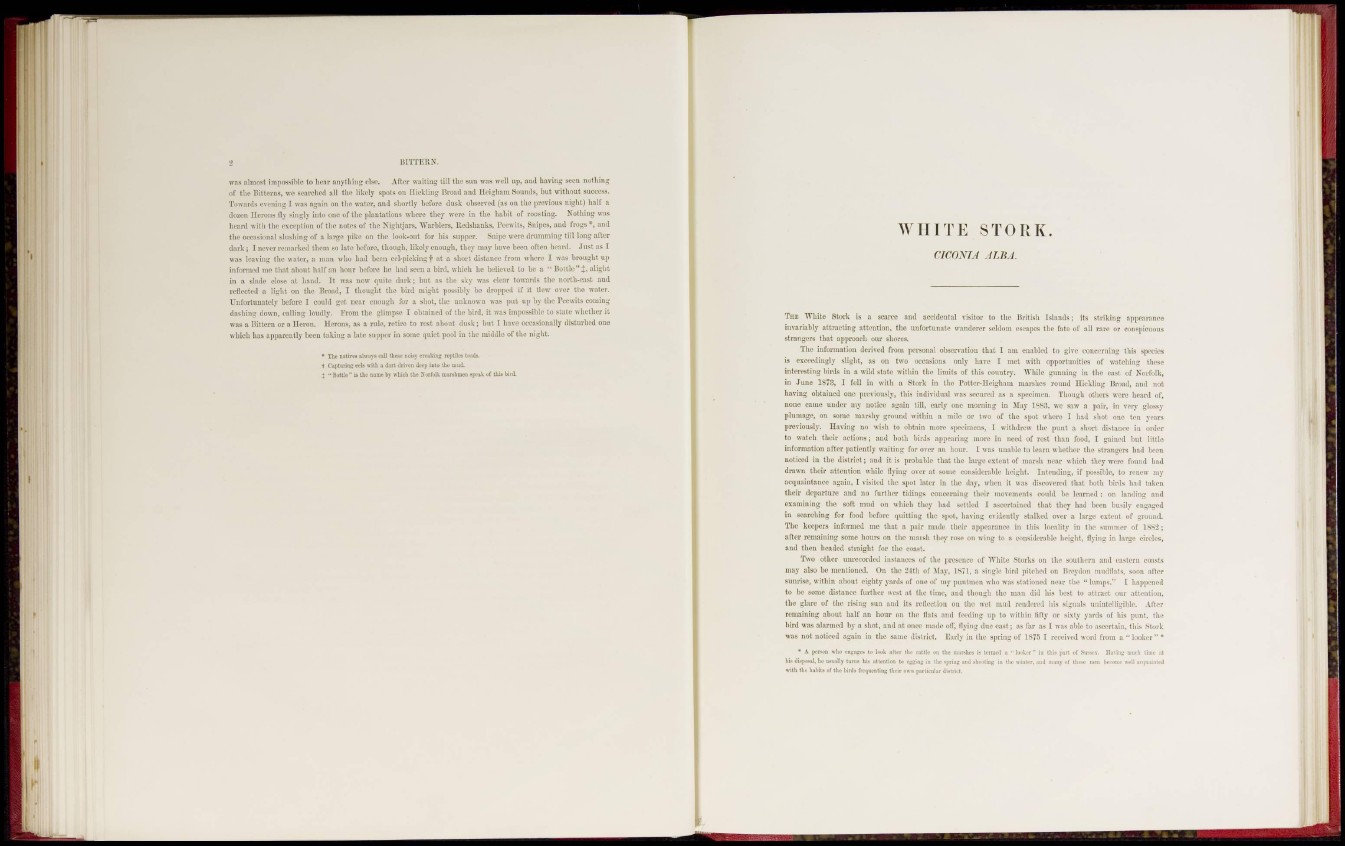
BITTERN.
was almost impossible to hear anything rise. After waiting till tli'- sua was well up, and having seen nothing
of the Bitterns, we searched all the likely spots on Ilickling Broad and Ilcigham Sounds, but without success.
Towards evening 1 was again on the water, and shortly before dusk observed (as on the previous night) half a
dozen Herons fly singly into one uf the plantations where tiny were in the habit of roosting. Nothing was
heard with the exception of the notes of the Nightjars, Warblers, Bedshuuks, Peewits. Snipes, and frogs " , and
the occasional slushing of a large pike on the look-out for his supper. Snipe were drumming till long after
dark; I never remarked them so late before, though, likely enough, they may have been often heard. Just as I
Has leai iog the water, a man who bad been eel-picking f at a short distance from where 1 was brought op
informed me that about half an hour before be had seen a bird, which be believed to be a " Dottle" J. alight
in a slade close at hand. It was now quite dark; but us the sky was clear towards the north-oast and
reflected a light on the Broad, I thought the bird might possibly be dropped if it flew over the water.
Unfurl una lely l>efore I eonld get near enough for a shot, the unknown was put up by the Peewits coming
dashing down, calling loudly. Prom the glimpse I obtained of the bird, it was impossible to slate whether it
was a Bittern or n Heron. Herons, as a rule, retire to rest about dusk; but I have occasionally disturbed one
which has apparently been liking a late supper in some quiet pool in the middle of the night.
* The utiTH ilmii. mil ihmc nniiy rnukini; nptiln trait.
t Capturing oel. Willi O dirt Una deep into the mud.
t " Bottlo " it the nnme by ithich the Norfolk manhmen anat u[ tliii bird.
WHITE STORK.
CICONIA ALBA.
THE While Stork is a scarce and accidental visitor to the British Islands; its striking appearance
invariably attracting attention, the unfortunate wanderer seldom escapes the fate of all rare or conspicuous
strangers that approach our shores.
The information derived from personal observation thai 1 am enabled to give concerning this species
is exceedingly slight, us on two occasions only have I met with opportunities of watching these
interesting birds in a wild slate within the limits of this country. While gunning in the cast of Norfolk,
in June 1S73, 1 fell in with a Stork in the I'ottcr-Heigham marshes round llickling Broad, and not
having obtained one previously, this individual was secured as a specimen. Though others were heard of,
none came under my uotiee again till, early one morning in May T.CSÍJ, we saw a pair, in very glossy
plumage, on some marshy ground within a mile or two of the spot when; I had shot one ten years
previously. Having nn wish tn obtain more specimens, | withdrew the punt a short distance in order
to watch their actions; and both birds appearing more in need of rest than food, I gained but little
information after patiently waiting for over an hour. 1 was unable to learn whether the strangers had been
noticed in the district; and it is probable that the large extent of marsh near which they were found had
drawn their attention while Hying over at some considerable height. Intending, if possible, to renew my
acquaintance again, I visited tin' spot later in the dav, when it was discovered that both birds bad taken
their departure and no further tidings concerning their movements could lie learned : on binding and
examining the soft mud on which they had settled I ascertained that they had lieen busily engaged
in searching for food before quilting the spot, having evidently stalked over a large extent of ground.
The keepers informed me that a pair made their appearance in this locality in the summer of 1SS2;
after remaining some hours on the marsh they ruse on wing to a considerable height, living in large circles,
and then headed straight for the coast.
Two other unrecorded instances of the presence of White Sturks on the southern and eastern coasts
may also In- nicntioiusl. (In the 21th of May, 1071, a single bird pitched on Breydon inndllats. soon after
sunrise, within about eighty yards of one of my puntmen who was stationed near the •' lumps." I happened
to be some distance further west at (he lime, and though the man did his liest to attract our attention,
the glare of the rising sun and its reflection on the wet mud rendered his signals unintelligible. After
remaining about half an hour on the flats and feeding up to within lift y or sixty yards of bis punt, the
bird was alarmed by a shot, and nt once made oil', living due cast; as far as I was able to ascertain, this Stork
was not noticed again in the sanie district. 13arly in the spring of 1ST5 T received word from a " looker" •